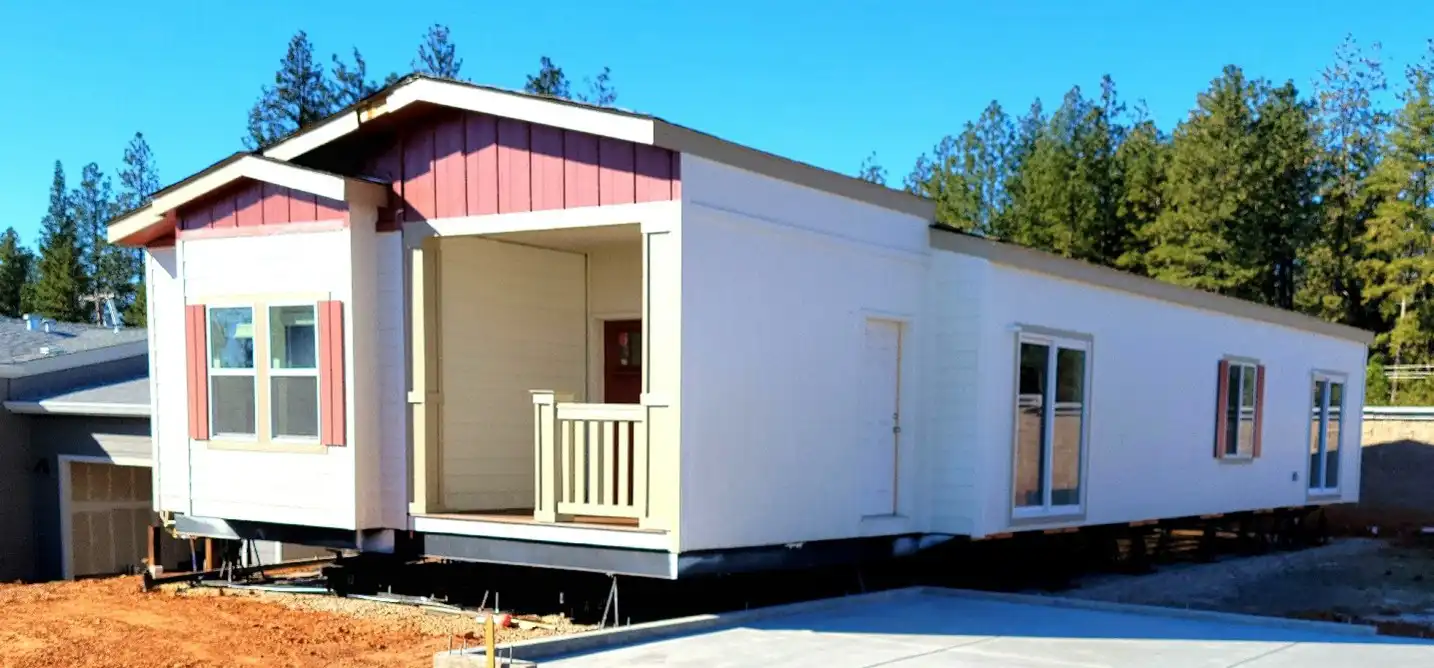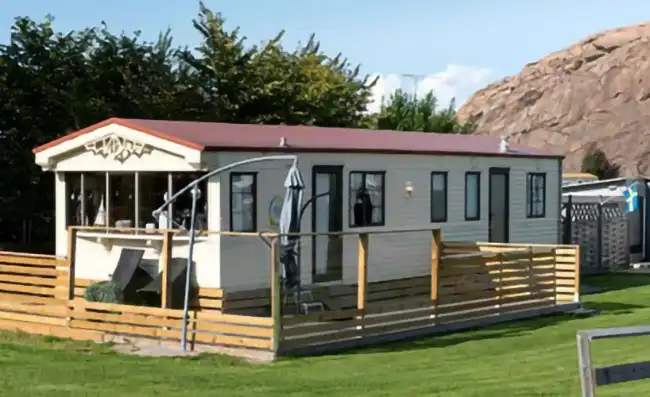
Manufactured housing — and this includes mobile homes — make up a key segment of financially accessible housing. Today, 18 million people have roofs overhead thanks to manufactured homes. Most own them. Most are deed holders who took out mortgages from banks or credit unions.
But it wasn’t easy for them. Some applied for regular mortgages, to finance the manufactured home and the land under it. Half of these applicants are turned down.
What if they’re not applying to become deed holders, but trying to finance the homes only? Almost two-thirds of that group gets turned down.
High Risk: Turning to Alternative Financing
Buyers who can’t get approved for a mortgage or home-only loan often turn to alternative financing — the risky route of paying while the seller holds the deed.
Homes titled as personal property rather than real estate are not eligible for a mortgage at all. These are typically recorded with the state’s department of motor vehicles. Their buyers are more likely to be from minority households.
Some are “contract buyers” who won’t receive the deed to their homes until they pay off the loan. And yet they typically handle all the repairs and maintenance. Sometimes they handle the property taxes. They could be out on their ears if they run into financial trouble, and get nothing in terms of sweat equity. And contract financing generally puts a household off-limits to government disaster recovery funds.
If, under state law, home borrowers could hold the deeds to the land beneath their manufactured homes, they could apply for mortgages. States could help here. They could make sure that their laws facilitate the titling of these homes as real estate. New Hampshire already does. So do Illinois, Missouri, North Carolina, North Dakota, and Oregon — at least if the home’s sitting on a permanent foundation or a land lease of 20+ years.
In short, in most places a manufactured home comes with a real estate deed only if the owner also owns the land. Otherwise, it’s personal property. Having the deed makes a world of difference.
FHA Rules: Skewed Against Manufactured Home Buyers

The Federal Housing Administration (FHA) insures personal property loans under its Title I Manufactured Home Loan Program in the National Housing Act. It backs regular mortgages under Title II.
Unfortunately, the FHA Title I is more of a hassle for lenders. Personal (a.k.a. chattel) loans rely on a good deal of actual paperwork. Lenders have to use manual underwriting processes to know if a loan is eligible for federally backed insurance.
The Title II “scorecard” generates an automated approval for most mortgage applicants. Only a minority of applications get flagged for the more burdensome process of manual review.
Lenders may balk at the manual underwriting that’s needed for an FHA Title I personal property loan. Maybe this kind of lending is not quite as safe, they might feel. After all, they can’t show the automated approval from the system to back up these loan decisions.
And another thing. FHA insurance only covers 90% of the value of a Title I personal property loan.
For a regular mortgage, the FHA backs the whole amount, 100%.
Why the difference? Home-only loans aren’t riskier. And the vast majority of manufactured home borrowers are current on their loan payments. Insurance should cover 100% for both loan types.
Let’s make this simpler. There are lenders who rightly see manufactured housing as a big part of the future. They want to get involved. And that would greatly help U.S. housing affordability.
What the Government Should Do—ASAP
The process of lending to a borrower for a manufactured home already takes enough time and attention. Buyers of manufactured homes tend to be talking to the lender while choosing what layout and appliances they want in the home. The lender and prospective borrower have a lot of interacting to do. The borrower’s application might need a lot of work to get it ready for underwriting. It’s not the same as doing a regular home with a borrower guided by a real estate agent.
The government needs to do its part to support willing lenders, not stifle them. In fact, both the Biden and Trump administrations have vowed to update federal housing agencies’ systems and methods. Last year, the FHA and the Government National Mortgage Association (Ginnie Mae) made a start on the modernization of manufactured housing loans. But many unnecessary hassles remain. We need effective follow-through.
The Pew Trusts and the nonprofit, non-partisan FinRegLab have done some issue-spotting to advance affordable housing through better manufactured home financing. Here’s what they say we need most, and soon:
- We need consumer protections at the federal and state levels for people who use contract financing. Contracts should be publicly recorded. They should also have to adhere to homeowners’ laws, empowering the borrowers with rights to their equity.
- We need Freddie Mac and Fannie Mae to become champions of personal property loans. And Ginnie Mae could see to it that lenders have a secondary market for these loans, just as mortgage lenders have. Today, home-only loans can’t be resold like mortgages. This means many lenders lack incentives to get involved with these loans.
- We need home-only loan applications to mirror mortgage loan applications that lenders are already accustomed to doing. Let the borrowers finance their closing costs and accept gifted down payments. Have the same verification rules for income, employment, debt, and assets.
- We need less overall dependence on credit scores, and more accessibility to cash-flow underwriting. That lets lenders count rents and bank account data. It would help expand loan access to many capable borrowers. The government needs to fund digital modernization to make this work.
- We need the government to allow for manufactured home loan sizes that anticipate inflation.
All of the above would promote a workable market for home-only loans. Even buyers who are buying the land sometimes prefer a personal property loan over a mortgage. It could lead to a simpler, faster closing.
All Things Considered…
There’s much to be said for getting a deed to the home and land with a regular mortgage. Remember that you pay more interest for home-only loans, and get less legal protection. States that deprive borrowers of mortgage access (by restricting the way a manufactured home can be titled) should consider updating their laws.
Manufactured homes are becoming easy to shop for online. They’re built to modern standards. Some of these homes appreciate over time as traditional homes do. This makes holding the deed a good investment, and a good deal.
Supporting References
FinRegLab, via PewTrusts.org:Modernizing Manufactured Home Financing (PDF; Dec. 19, 2024).
Rachel Siegel, Seva Rodnyansky, and Dennis Su for The Pew Charitable Trusts, via PewTrusts.org: Issue Brief – One in Five Manufactured Home Borrowers Use Risky Contract Financing (Jan. 9, 2025).
Alex Horowitz, Tara Roche, and Rachel Siegel for The Pew Charitable Trusts, via PewTrusts.org: White Paper – Despite Reforms, Barriers Still Make It Difficult for Americans to Finance a Manufactured Home (Dec. 16, 2024).
And as linked.
More on topics: Contract for deed rules, New Hampshire manufactured housing warranty deed
Photo credits: Cullen328 via Wikimedia Commons, licensed under CC BY-SA 4.0 Int’l; and public domain via Timelessmoon.getarchive.net.
